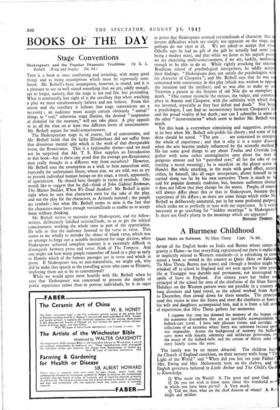BOOKS OF THE DAY
Stage Conventions
Shakespeare and the Popular Dramatic Tradition. lay S. L.
Bethell (King and Staples 10s. 6d.) THIS is a book at once comforting and irritating, with many good things and as many assumptions which must be vigorously com- bated. Mr. Bethell's basic assumption, however, is sound, and it is a pleasure to see so well stated something that we are, oddly enough, apt to forget, namely, that the stage is not real life, but pretending. What is continually lost sight of is the corollary that when watching a play we must simultaneously believe and not believe. From this axiom and the corollary it follows that stage conventions are a necessity ; an audience must accept certain obviously " unreal" things as " real," otherwise stage illusion, the desired suspension of disbelief for the moment," will not take place. A play appeals to us all the time on at least two different levels of consciousness. Mr. Bethell argues for multi-consciousness. The Shakespearian stage is, of course, full of conventions, and Mr. Bethell holds that the lucky Elizabethans did not suffer from that disastrous mental split which is the work of that disreputable event, the Renaissance. This is a fashionable theme—and we need not be surprised that Mr. T. S. Eliot supplies an Introduction to this book—but is there any proof that the average pre-Renaissance man really thought in a different way from ourselves? However, Mr. Bethell uses the assumption as a stick to beat naturalism with, especially the unfortunate Ibsen, whose aim, we are told, was to try to present individual human beings on the stage, a result, apparently, of agnosticism. He should have thought in terms of symbols. One would like to suggest that he did—think of Sohn Gabriel Borkman, The Master Builder, When We Dead Awaken! Mr. Bethell is quite right when he says that characters exist for the sake of the play, and not the play for the characters, as Aristotle insisted ; the people are symbols ; but what Mr. Bethell seems to miss is the fact that the characters must have enough verisimilitude to enable us to accept them without thinking. Mr. Bethell strives to maintain that Shakespeare, and his fellow- writers, deliberately falsified verisimilitude, so as to get the critical consciousness working the whole time as part of the appreciation. He tells us that the audience listened to the verse as verse. This seems to me wholly to mistake the object of blank verse, which was an attempt to forge out a suitable instrument for stage diction; when Shakespeare achieved complete mastery it is extremely difficult to distinguish between prose and verse; think of The Tempest. And one might ask how many people remember off hand in a play so early as Hamlet which of the famous passages are in verse and which in prose. If Shakespeare was so anti-naturalistic, we might ask, why did he make that speech to the travelling actors who came to Elsinore, imploring them not to be so conventional?
While we would agree most heartily with Mr. Bethell when he says that Shakespeare was concerned to present the depths of poetic experience rather than to portray individuals, he is so eager to prove that Shakespeare scorned verisimilitude of character that h invents difficulties which are simply not apparent on the stage, an
perhaps do not exist at all. We are asked to accept that whe Othello says he had no gift of the gab he actually had none (n being a modest man), and that while we listen to his superb poetr we are exercising multi-consciousness, if we are, luckily, mediae‘ enough to be able to do so. While rightly attacking the extrem Bradleian school of psychological interpreters, he oddly accept their findings. " Shakespeare does not satisfy the psychologists Wit his character of Cleopatra "; and Mr. Bethell says that he was nu concerned with consistency in this play (which was written to oppos the intuition and the intellect), and so was able to make so un Victorian a person as the Serpent of old Nile die so exemplary death. " One cannot reconcile the vicious, the vulgar, and common place in Antony and Cleopatra with the sublimity with which the are invested, especially as they face defeat and death." Not bein a psychologist, I can find no inconsistency between Cleopatra's lir and the proud vitality of her death ; nor can I subscribe to some o the other " inconsistencies " which seem to bother Mr. Bethell ye much.
Yet this book is everywhere stimulating and suggestive, perhap at its best when Mr. Bethell soft-pedals his theory ; and some of hi dicta should be noted. "The arts . . . are concerned to interpre the whole of experience ; and that is why it is a major disaste when the arts become unduly influenced by the scientific method. He has some good things to say about Troilus and Cressida (t gether with some rather unimaginative ones about the man gorgeous armour and his " putrefied core," all for the sake of ex tracting a moral meaning) ; he is excellent on the player scene Hamlet. But while attacking, in the main with good effect, certai critics, he himself, like all eager interpreters, allows himself to b. carried along too far by his own corrective. There is much to b. said for popular dramatic tradition, but, because audiences change it does not follow that they change for the worse. People, of cours will always differ about this or that in Shakespeare, because the' experience of life differs ; so there are some things which strike Mr Bethell as deliberately unnatural, put in for some profound purpose which strike me as perfectly in tune with my experience. Is it reall necessary to go searching for " hidden meanings " in Shakespeare. Is there not God's plenty in the meanings which are apparent?
BONAMY DOBREE.


























 Previous page
Previous page